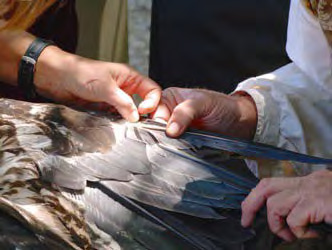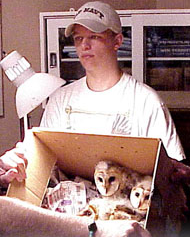Before Calling Last Chance Forever, please read the following:
If you found a hawk, falcon, owl, vulture, or eagle, please read this page to determine whether or not it needs assistance. You may need to watch the bird for several minutes to determine if it should be rescued or if it’s just resting.
When in doubt, please call us with any questions at (210) 499-4080.
Signs a bird might be injured or sick
Just because a bird is sitting on the ground beneath a tree, or a nest does not mean it is hurt. Look for obvious signs of distress, such as:
- Bleeding
- Limping
- Trouble standing or flying
- Dragging/drooping wing
- Falling over
If there are no obvious signs of distress – LEAVE IT ALONE!


Signs a fledging (baby bird) has been orphaned
Young birds out of the nest are not necessarily abandoned. When a bird is “branching” (beginning to learn to fly), it may fall to the ground but continue to be cared for by the parent until it is capable of flight. Look around for signs of the nest or a parent. Parents often travel and bring back food, so watch the baby for a while to make sure the parents aren’t returning.
If the baby is alert, active, and moving normally, it is likely being well cared for by its parents; if the baby looks sick and weak, it may be an orphan that needs assistance.
Whenever possible, if you see a nearby nest, you should try to put the bird back in the tree rather than removing it from the area. Contrary to popular belief, birds don’t have a good sense of smell so they won’t abandon a baby because the baby smells like a human. You can also read our article about baby birds for more information on how you can help.
Contact a Specialist for Help
When you see a bird in trouble, call for advice. You can reach Last Chance Forever at (210) 499-4080. Staff are on site 7 days a week from 9-5 and will answer calls and return messages as quickly as possible. Last Chance Forever provides emergency care for raptors only. For any other birds or animals, please check Texas Parks and Wildlife for a qualified wildlife rehabilitator near you or Wildlife Rescue and Rehabilitation at (830) 336-2725 and leave a message and they will call back.
Note: While our Facebook page is a great place for general information, we only actively monitor phone calls, so please call us at (210) 499-4080.
Your local veterinarian may also be able to provide basic information. Contact your local veterinarian or rehabilitator (Texas Parks and Wildlife maintains a list) and get advice on how to transport the bird appropriately. If you are in the San Antonio area, call Last Chance Forever at (210) 499-4080.
Handling & Transportation
It is likely you will need to transport the bird; few facilities are staffed to be able to come pick up injured birds. If the bird must be handled and transported, it is important to do so carefully, for both you and the bird’s safety. Basic equipment may include heavy gloves, an animal crate (or appropriately sized, securely closeable box), a broom, and towels or blankets.
- Don’t put yourself in danger trying to rescue the bird. Remember, these birds are hurt wild animals and they don’t know you are trying to help them so they may try to defend themselves. Be thoughtful and cautious in your approach.
- Do minimize stress if you need to transport the bird. Once the bird is contained, keep the box/pet crate in a quiet, dark place and transport it to a certified professional as quickly as possible.
- Don’t give the bird food or water unless told to do so by a wildlife rehabilitator. The wrong type of food (or even the right type of food when the bird is already sick, starving, or injured) can cause more harm than good.
Please call us at (210) 499-4080 if you have questions about safe handling and transport of a bird of prey. If you are delivering the bird to the Last Chance Forever San Antonio center, please call to let the staff know you are on your way.
